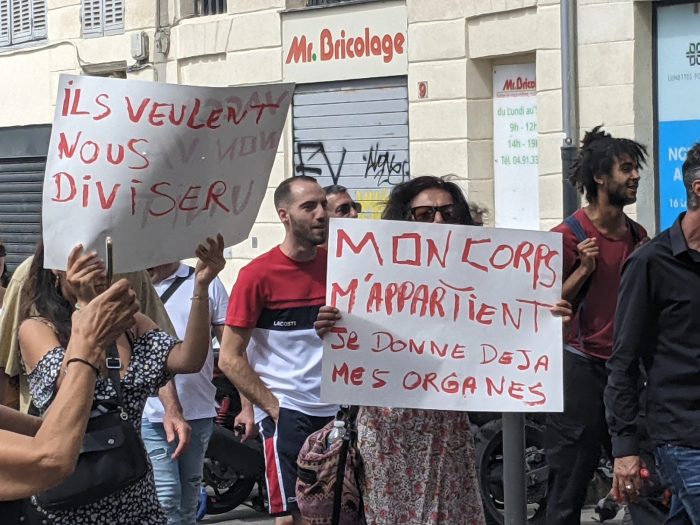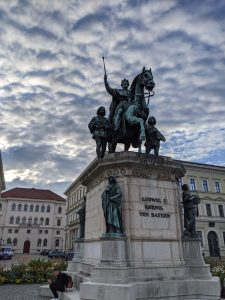Traveling on the edge of a pandemic – Part one
Taking a solo backpacking tour through Europe proves the scars of COVID-19 are deep

Taking a solo backpacking tour through Europe proves the scars of COVID-19 are deep
By Kyle Barr
France

There was a young man in Toulouse, France, one of only two people in a hostel dorm room, the other being me. We were two in a room meant to facilitate 15. A Parisian traveler, he had taken trains and buses down to Toulouse, named the Pink City (Ville Rose) for its famous blush-red brick. We had a good sight of the street and that colored stone out of the window we shared between our beds.
“I want to see more of my country while I can,” he told me during that cool, wet night in July. He also told me he still hadn’t gotten a vaccine for COVID-19. I had, but I was sleeping just 3 feet away from him.
This should be a normal interaction for travelers through Europe but, in a space like that, the conversation inevitably moves toward the pandemic. He tells me he did not know why he hesitated to get the vaccine. It could have been nerves. It could be the kind of anti-authoritarian impulses that us Americans know only too well. He, along with so many French citizens, have railed against the French President Emmanuel Macron for their mandated proof of a vaccine or negative COVID test for everything from cafés to concerts.
On July 14, Bastille Day, protests rolled out from France’s cities. I watched one in Marseille make its way from the old docks up to the local municipal building. The protesters were shouting “Liberté!” while holding signs reading, “Mon corps m’appartient!” meaning “My body belongs to me!”

But the young Parisian man said that, despite his anger, it could actually change his mind.
“Maybe this will finally make me get the vaccine,” he told me.
Reuters’ data show an estimated 73% of France’s population has been vaccinated. That compares to an approximate 59% in the U.S. I wonder if that young man I met in Toulouse ever got his shot, but we were traveling in opposite directions, and I don’t think I’ll ever know.
There’s only one time that something can be done for the first time. So doing a European backpacking trip is one thing — an enormous thing to do as a novice. Doing it during a once-in-a-century pandemic is another thing entirely.
This past summer I made a very sudden decision to take a two-month backpacking trip through several countries in western Europe, starting June 23 and ending Aug. 18. Beginning in France, I went south to Basque country in Spain, back into France before going into Switzerland, then Germany, the Netherlands, then to Denmark before a quick flight over to Iceland.
My trip began on the very edge of when we all thought the pandemic would subside, just after many European countries started opening their doors to overseas travelers. My trip coincidentally ended just after those same nations started to roll back those open-armed policies. France instituted a COVID passport system just weeks after I left, and it is still only really available to French citizens, meaning that it would be nearly impossible to do half of what I could do just a few months before. Other European countries have instituted new restrictions and lockdowns. It means there was one small three-month period, one golden time slate when the classic Euro tour was still possible. That’s gone now.
Currently, rules are in flux, and Americans may find that restrictions can change between the time they book a trip and their departure dates. Unvaccinated U.S. passengers especially need to keep on top of all the changing regulations.

I wonder now if things will ever return to that golden age of pandemic-era travel and, at the same time, whether we ever should go back. Because even during this perfect period when summer travel was (mostly) possible if one carried a vaccine card tucked inside a passport, adventuring alone in pandemic-scarred lands is not as it once was. It may never be the same again.
Germany
I stayed in a total of 17 hostels, one tiny hotel, two Airbnbs and two stays at kindly people’s homes. During my visit to Hamburg, Germany, I chatted up the hostel staff and heard, like most hostels along my route, they were doing barely 30 to 40% of what they had done in 2019. Backpacking alone relies on one’s ability to strike up conversations with strangers, to meet new people from all over and organize a day’s activities, but the pandemic has done more than hamper worldwide travel. It has also changed certain attitudes. Less people seem to be willing to sit down with strangers to have conversations while the pandemic lingers.
That’s not to say people are more obtuse or less friendly, but there is a sort of wariness hanging about all interactions. Most travelers I met spoke similarly about that general feeling hanging like a cloud above people’s heads. Part of it was the lack of people in hostels, but there also was a defining sense of separation.
Kyle Barr is a freelancer writer and the former editor of The Port Times Record, The Village Beacon Record and The Times of Middle Country.






